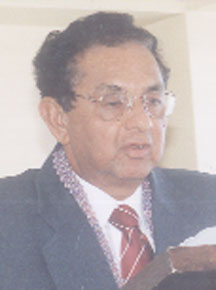Retired Chancellor of the Judiciary Justice Cecil Kennard has urged citizens to uphold their civic duty in the fight against crime, while also admitting that public confidence in the police force has been lost due to corruption by ranks.
He was speaking at the 6th Ethnic Relations Commission lecture, hosted in Anna Region last Thursday.

According to a Government Information Agency (GINA) press release, before addressing the topic of the lecture, Kennard noted that a recent High Court injunction against its three Commissioners does not prevent the ERC from functioning. “The holding of the lecture should not be seen as a breach of the Court Order,” he said, while adding that “There is a secretariat established by the constitution and work of the commission must continue until the matter is resolved in court.”
This session’s topic was: “All stakeholders working together to combat crime ensures ethnic security and harmony.” According to Kennard, Article 32 of the Constitution states, “It is the joint duty of the state, the society and every citizen to combat and prevent crime and other infractions of the law and to take care of and protect public property.” He also referred to Section 18 of the Police Act, which provides for members of the police force to enlist the assistance of any person in the execution of his/her duties.
Kennard also noted that any person who refuses to render such assistance can be charged and placed before the Court.
Kennard, who is the Chairman of the Police Complaints Authority, em-phasised that citizens have a civic duty to help to fight crime as the police cannot be everywhere at all times.
However, he also acknowledged that the public has lost confidence in the force as some officers are engaged in corrupt practices. It is believed that some younger members of the force, particularly the traffic cops, have simply joined in order to “catch their hands.” At the same time, Kennard said most members of the police force are honest and hard working.
He also noted that there are “umpteen” cases of police harassing civilians but people are afraid to come forward because they fear victimisation.
He lauded the brave persons who have lodged complaints about such abuses and noted that unless persons come forward and provide information, the force will not be able to put an end to corrupt practices, though senior officers are doing their best to curb them.
Regarding the upcoming elections and the need for a secure and peaceful environment, the retired judge urged the public to make a special effort to ensure peace and stability prevail during the period.
GINA said Kennard also addressed the effect of unemployment and migration, contending that jobs have to be found for youth or they may resort to crime.
Seventeen persons participated in the interactive sessions. Some said they were concerned about politicians who use the elections period to “stir up trouble” while others suggested that the ERC host a special session for politicians.
It was also suggested that the Commission hold a session with the army. A participant noted that some media workers incite racial offences.
At the close of the session, participants suggested that citizens need to cooperate to develop the country. In response to the comments, Justice Kennard agreed that elections problems occur mostly within Georgetown. “If the politicians should be more mature and tell the people how to behave we are not going to have street protests,” he opined.
Peter Persaud, Commissioner of the Women and Gender Equality Commission said the lecture series is part of the ERC’s strategic work programme for 2011. GINA said information from the ERC revealed that over 260 persons attended the lecture.
Participants came from 63 organisations and 42 communities, including the Amerindian Villages of Wakapau, Lake Mainstay, Mashabo, Moruca and the Pomeroon River.





